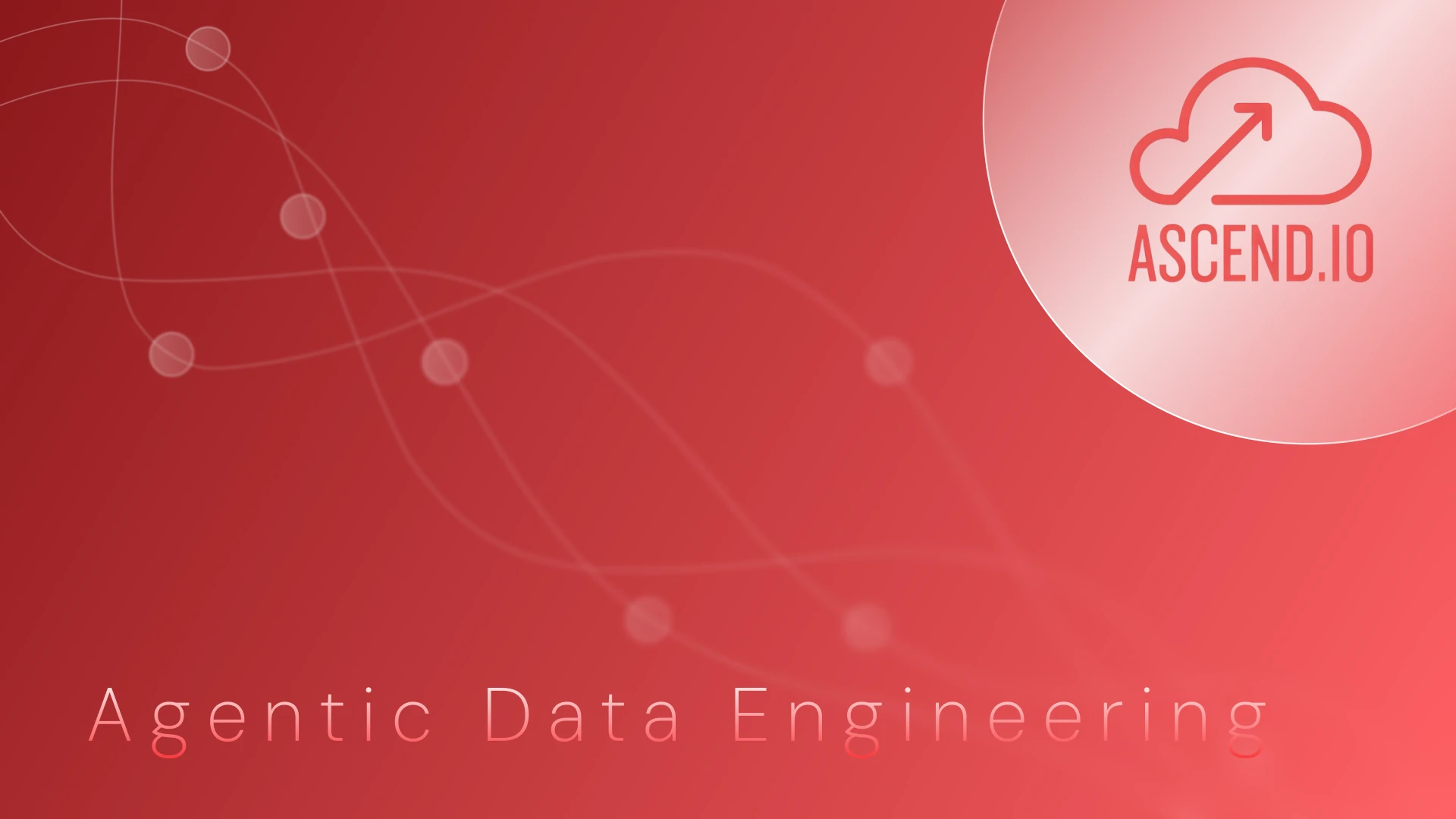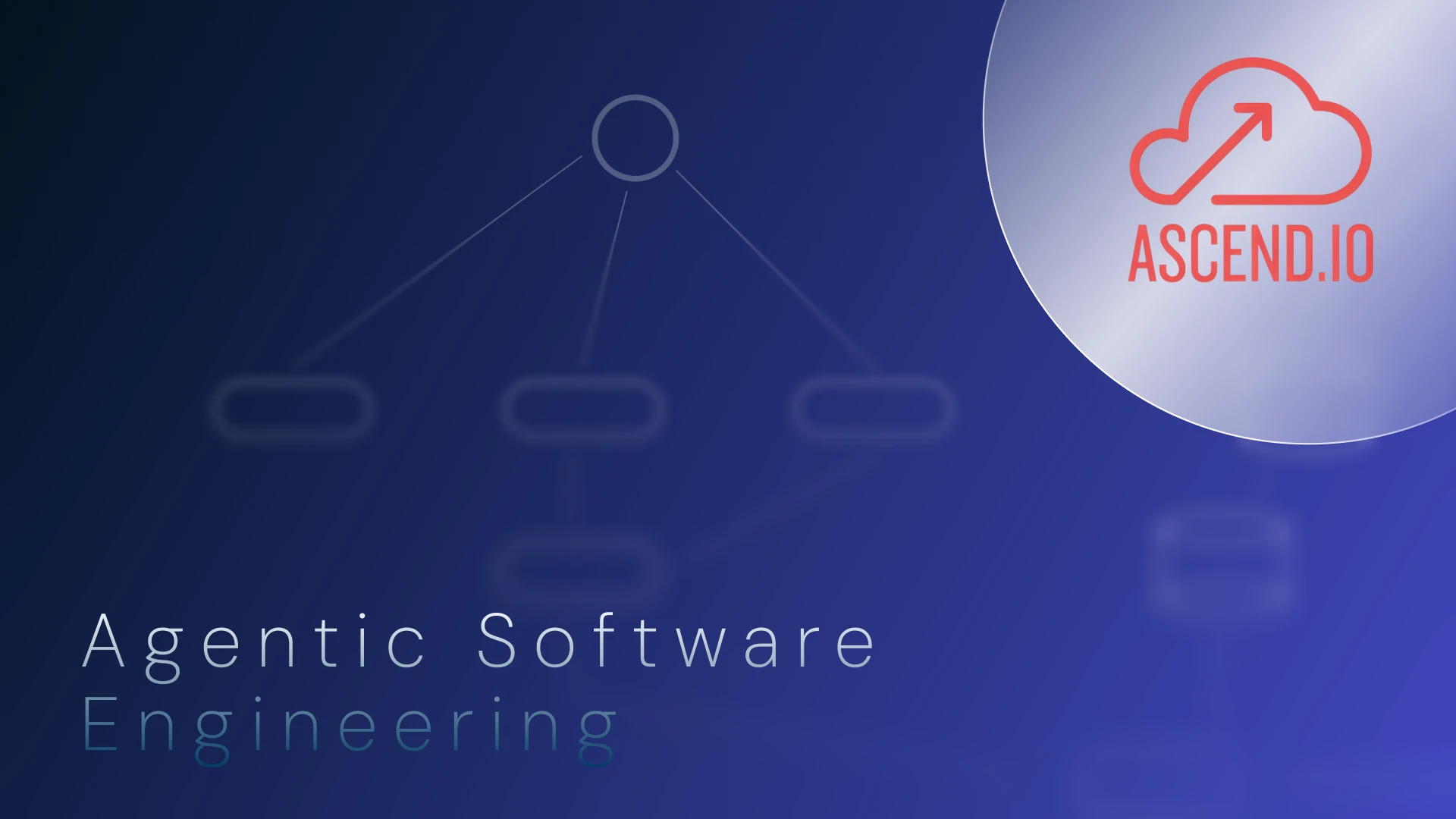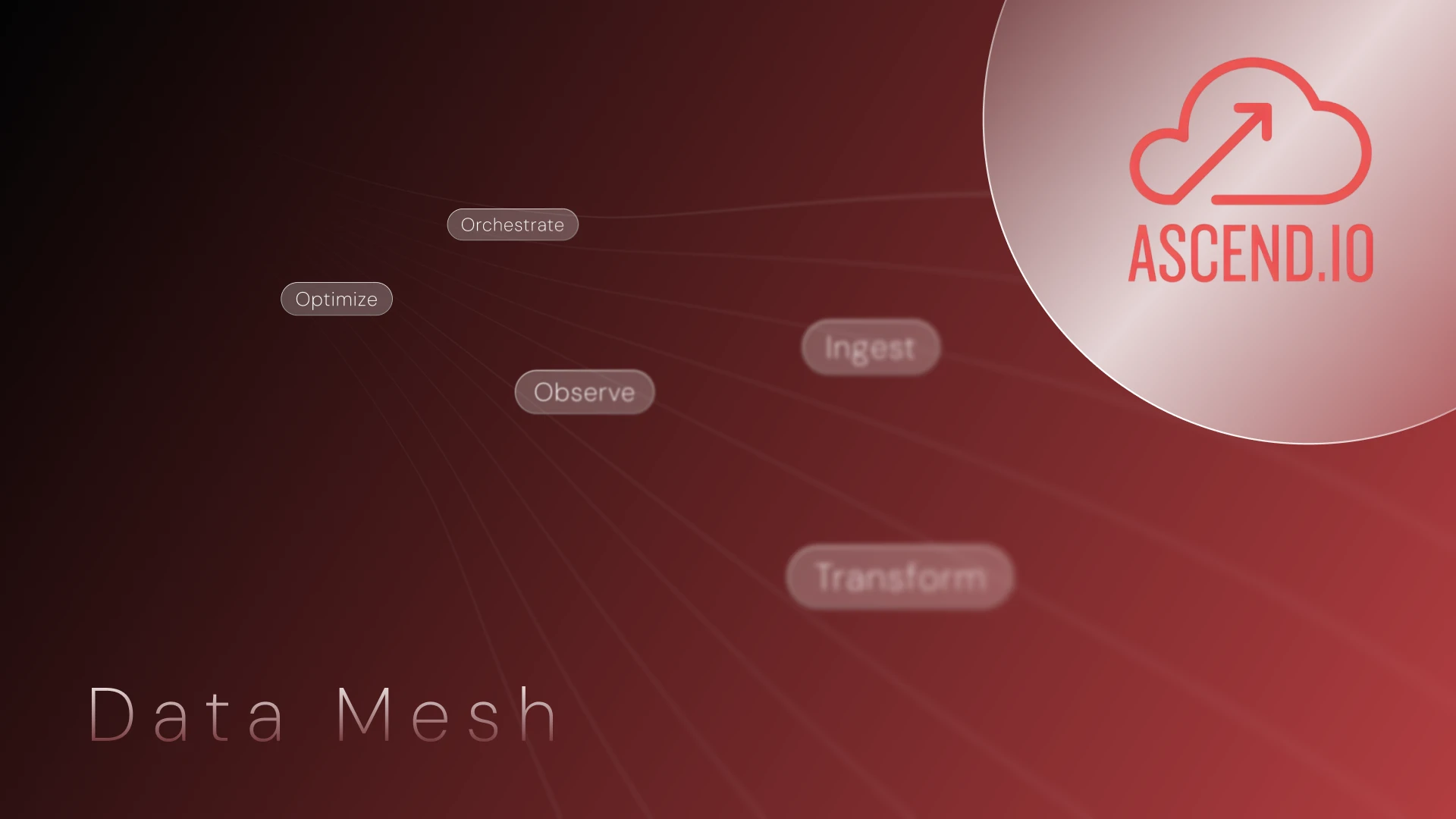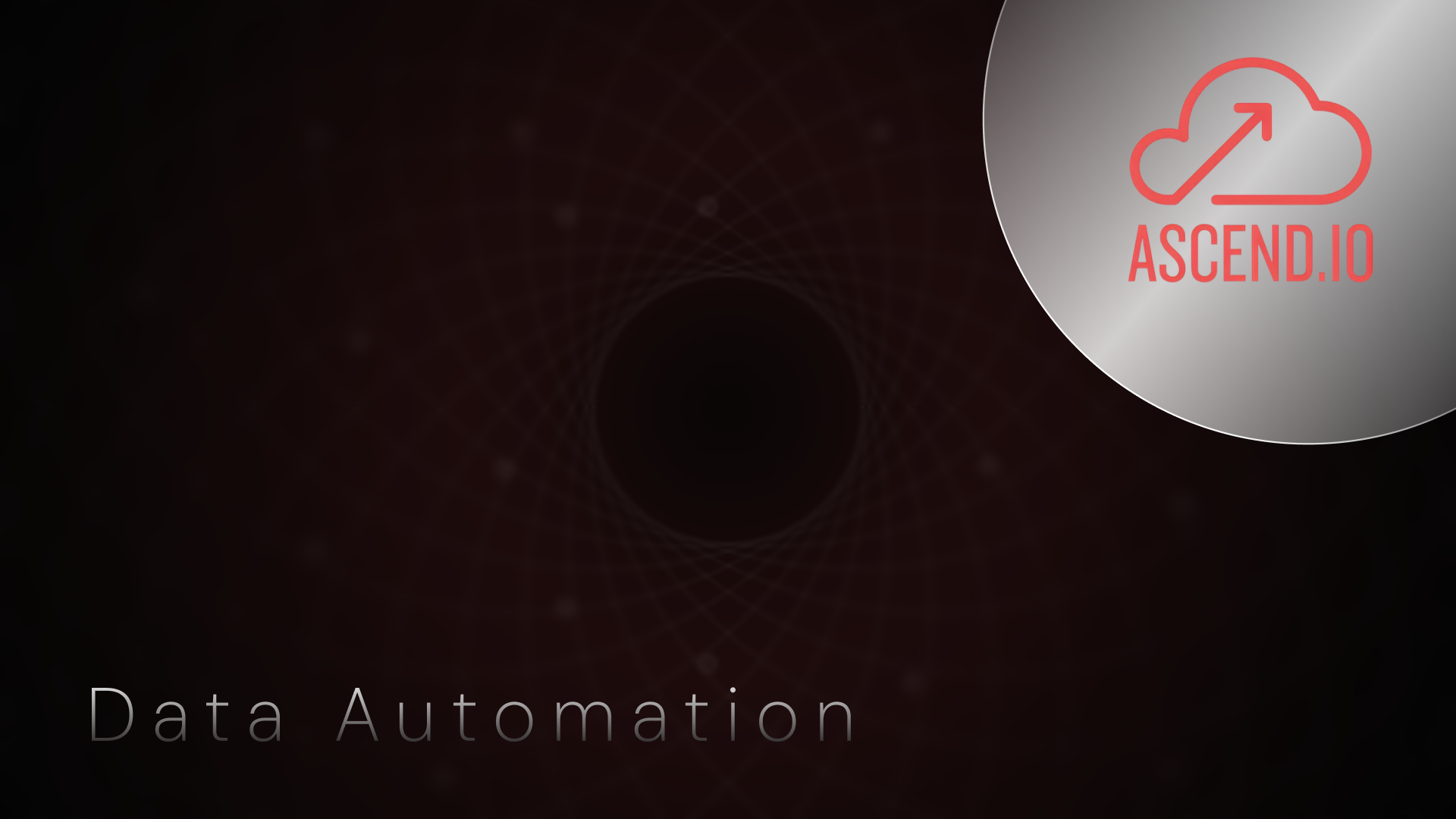We're excited to launch the first AI-native data stack for agentic data engineering. This launch represents more than a year of effort that began with a full re-architecture of the Ascend data automation platform for the age of AI assistants and agents. Today, we are releasing the first of many new agentic data engineering features that will be rolling out to Ascend users over the next few months.
Introducing Agentic Data Engineering
Agentic Data Engineering (ADE) is the next evolution of data operations (DataOps) built for modern AI systems. While data tooling has improved drastically over the past few years, most data teams are unable to take advantage due to their cumbersome legacy data platforms. Engineers are frequently spending their time keeping infrastructure & platform afloat instead of writing and optimizing data code.
Today, we’re launching something fundamentally different: the next-generation Ascend platform with a complete reimagining of how data teams build, operate, and scale their pipelines.
This isn't another AI assistant awkwardly bolted onto your existing stack. It's a fundamentally different model where customizable agents work alongside your team to build pipelines, identify issues, recommend changes, and take action. Autonomously. Intelligently. In context.
We're entering a new era for data engineering platforms: one that's AI-native from the ground up, deeply integrated with your stack, and built to scale with your team.

What Makes Agentic Data Engineering Different?
Agentic data engineering is the practice of deploying AI agents to assist teams in building, managing, and optimizing data pipelines. By providing agents with full context of system metadata, logic, and runtime behavior, these AI agents assist engineers with fundamental tasks, enabling them to build data pipelines faster, more safely, and at greater scale.
Instead of expecting humans to manually define every task, manage every incident, and babysit every pipeline, agentic systems shift data engineering toil to intelligent agents embedded within the platform. These agents understand what's happening, collaborate with developers, and act independently so that data teams can deliver data faster, more reliably, and at scale.
This isn't theoretical—it's live in Ascend today. And it manifests in four core experiences:
1. Chat With Your Stack
A natural language interface that lets you ask real questions about your pipelines, debug broken flows, and request changes—without bouncing between dashboards or writing custom scripts.
Ask it things like:
- "Why didn't this pipeline run yesterday?"
- "What's using the most compute this week?"
- "Make this flow run hourly instead of daily."
- "Convert these components from SQL to Python"
And it'll respond with real answers, or just go do the thing.
2. Inline Co-Pilot
Contextual suggestions, right where you build. Agents surface completions, catch mistakes, explain build errors, and help define logic—all based on the actual metadata from your platform, not some generic language model sandbox.
It's context-aware, pipeline-aware, and schema-aware. Basically, everything your IDE wishes it knew.
3. Background Agents
These are the agents that never clock out. They monitor pipelines, spot anomalies, flag schema drift, recommend optimizations—and in many cases, resolve issues automatically.
You still get to choose how hands-off you want to be. But your agents always have your back.
4. Write Your Own Agents
For platform owners, architects, and power users who want full control, custom agents are your direct line to autonomy. Design custom agents that enforce your org's policies or trigger actions based on any conditions.
Think:
- "Review all production flows in us-west daily for missed SLAs and cost spikes."
- "Block any SQL transform that violates naming conventions."
- "Flag any new jobs using deprecated sources."
These aren't if-this-then-that scripts—they're full participants in the platform, operating off the same unified metadata layer as the engineers on your team.
Why Now?
Data engineers are busier than ever, and generic coding copilots only get them so far. GitHub's 2023 research shows developers using Copilot complete tasks 55% faster, with 87% reporting less repetitive work and 85% more confidence in their code.
But pipeline complexity doesn't live in your code editor. It spans metadata, scheduling logic, system dependencies, and runtime state. Generic copilots simply aren't enough.
Agentic data engineering picks up where they stop.
The Architecture: How It Actually Works
Agentic systems only operate effectively when the platform has the context to understand and execute tasks.
That sounds simple. But in practice, it requires deep visibility across every part of the data lifecycle—from how data is ingested, to how it's transformed, orchestrated, monitored, and governed. Without that unified view, even the smartest AI assistant is operating blind.
Most platforms weren't built for this AI-native approach. They split responsibilities across disconnected tools, each with its own limited scope. As a result, automation is shallow, agents can't reason about intent, and critical gaps make AI assistance virtually useless.
Ascend takes a different approach. The platform's Intelligence Core unifies the entire data lifecycle under one architecture, capturing and exposing the metadata needed for agents to operate with full context and autonomy.

The Intelligence Core: Three Critical Components
Ascend's Intelligence Core is what makes agentic data engineering not just possible, but practical. It consists of three core components:
1. Unified Metadata Collection
The system captures detailed, system-wide information across ingestion, transformation, orchestration, observability, and operations—automatically, without requiring manual instrumentation or annotation.
This includes:
- Ingestion sources — with details like schema structure, change history, and upstream systems
- Transform logic — including SQL & Python code, inputs, outputs, dependencies, materialization strategies, and partitions
- Execution state and run history — tracking not just status and performance, but sequence, lineage, retries, and anomalies
- Git-backed versioning — changes to logic and configurations are fingerprinted and version-controlled, so agents understand what changed, when, and why
Current and historic metadata is always fully available and fully queryable. Agents don't work off snapshots—they operate with full awareness of the live system. That's what lets them inspect, intervene, and recommend improvements with precision and context.
2. DataAware Automation Engine
The DataAware Automation Engine is the execution backbone of Ascend's declarative platform. It fingerprints both code and data as they evolve—tracking changes in logic and data to determine the most efficient way to execute pipelines.
Pipelines in Ascend can be triggered by traditional schedules or launched manually—but the system also supports dynamic execution based on changing conditions. This ensures that workloads are processed efficiently and only when needed, reducing cost, latency, and operational overhead.
While agents don't drive this optimization directly, they benefit from the intelligence it surfaces. Automated events like pipeline runs, errors, and performance anomalies are captured by the engine and can be used to trigger agent behaviors—whether that's notifying a team, opening an issue, or taking follow-up action based on policy.
This layer turns declarative intent into efficient execution—and emits the system signals agents rely on to act precisely and proactively.
3. Integrated AI Agents
Ascend's integrated agents are built into the platform—not bolted on—and operate with full access to real-time system metadata. They're not running isolated prompts or passive checks. They're listening to the live signals generated by the system: pipeline runs, schema changes, runtime failures, policy violations, and more.
With real-time awareness of how your system is running, agents don't just observe. They collaborate—helping teams stay ahead of incidents, quality issues, and operational debt.
Real-World Impact
Ascend agents operate with live, end-to-end visibility into your data systems—including code, data, run history, dependencies, SLAs, and Git-backed change tracking. That means they don't just surface issues—they understand them.
Here's the real-world impact we're seeing:
- Faster incident detection and resolution: Instead of hours spent combing through logs, agents pinpoint the root cause instantly—saving time and reducing downtime.
- Higher data reliability: Agents catch anomalies and drift early, enforcing data quality and integrity before bad data hits dashboards or ML models.
- Fewer manual reviews: Agents proactively enforce documentation standards, schema governance, and naming conventions—freeing up time for engineering teams.
- Reduced burnout: By automating the tedious and high-risk tasks, agents let engineers spend more time designing and building—and less time firefighting.
This is the power of autonomy in data engineering: fewer surprises, faster recoveries, and more time spent building what moves the business forward.
See It In Action
Agentic data engineering isn't a concept. It's real, it's working, and it's already changing how modern data teams build, manage, and scale their pipelines.
With Ascend, your platform doesn't just process data—it understands it. It doesn't just schedule jobs—it makes decisions. And it doesn't just send alerts—it takes action.
Book a demo to explore how agents can help your team move faster, stay more reliable, and get back to building new value—instead of managing pipelines.
.webp)




.webp)

.webp)



.webp)





.avif)
